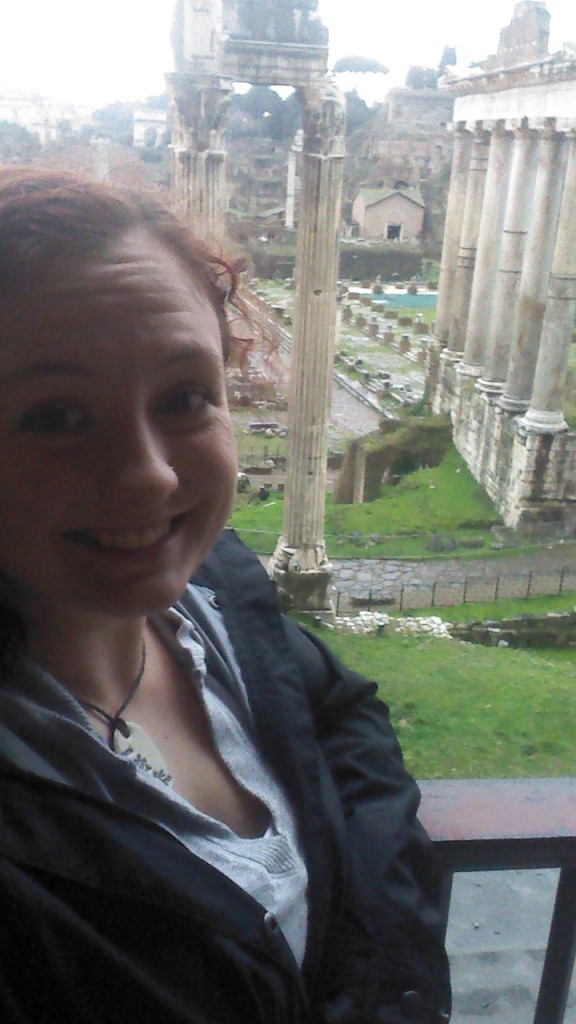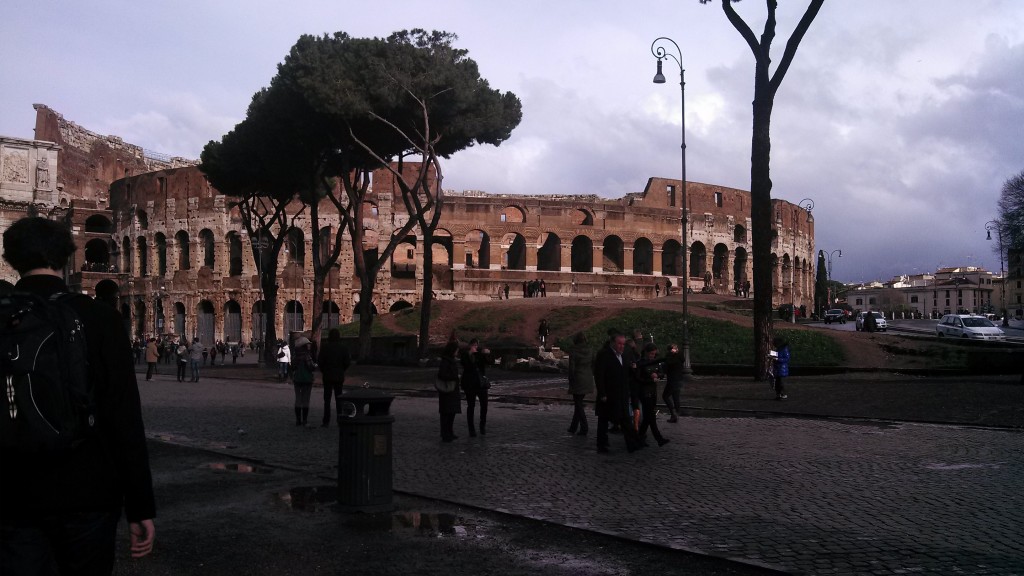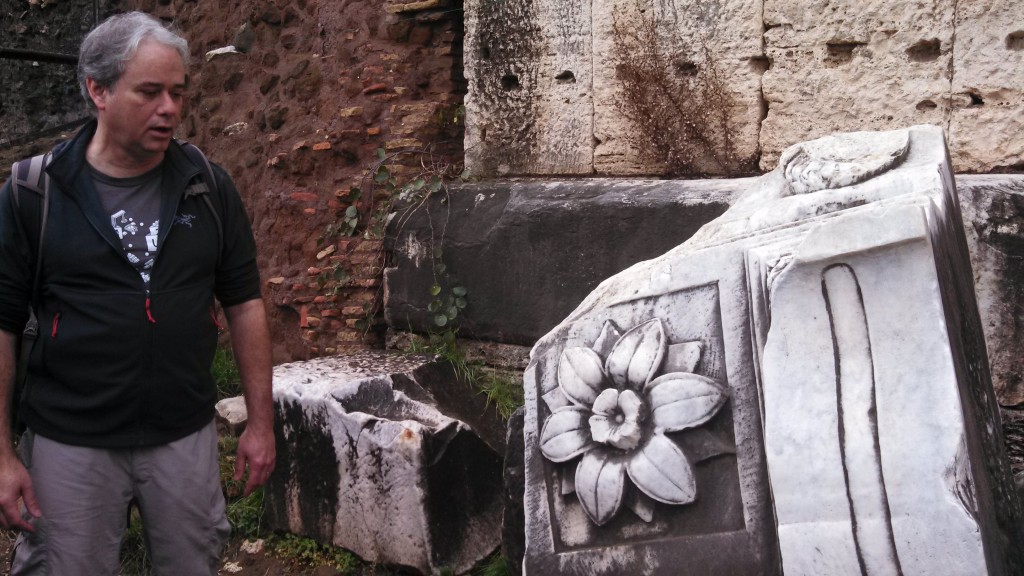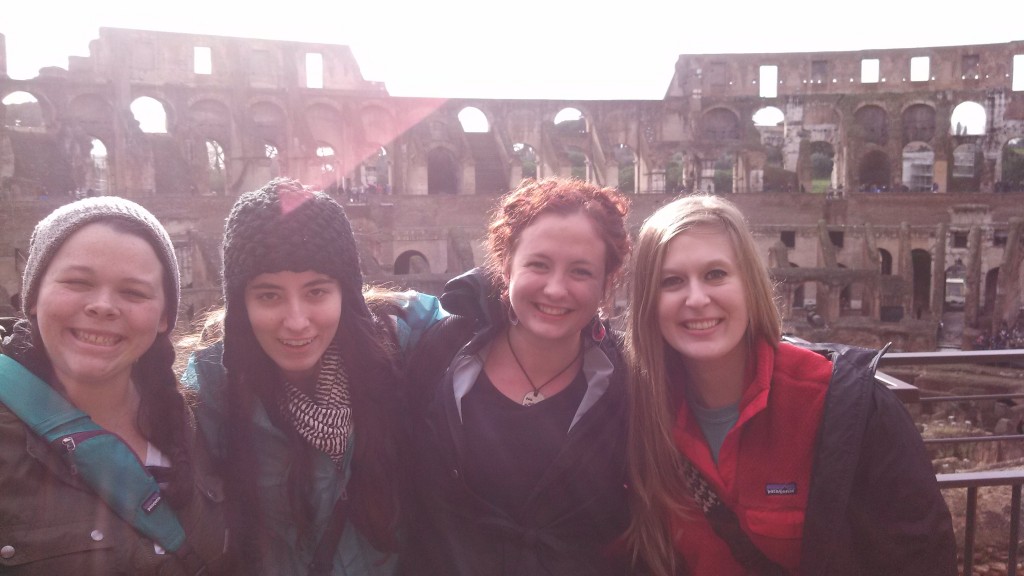Darby Guinn, honors English and journalism major, took her January intersession course abroad in Rome. Darby was one of 15 students who worked with classics professor David Fredrick to establish narrative and initial level designs for an online, game-centered version of the course Introduction to Classical Studies in Rome. The game will focus on the fictional (but plausible) history of a Roman family from the mid-Republic through late Antiquity, and the action will take place in the Circus Flaminius, the Theater of Marcellus, The Temple of the Vestals and the Ara Pacis, among other ancient sites. Once in Rome, Darby was met with towering 2,000-year-old architecture, the stress of trying to order a salami sandwich in Italian, and a new-found love for making the past come alive through video game writing.
Without Dick Kelty, I would not have survived my trip abroad. No, Dick was not on my trip, and no, I’ve neither met him nor know what he looks like. Dick Kelty invented the modern backpack in 1952, and I thanked him for it every day that I was abroad in Rome, Italy, studying Ancient Roman society for a video game. Whether it was toting around my books and sketchpads as we ran around an ancient ghost town or packed to the brim as we sprinted through the infamous Charles de Gaulle Airport, my backpack proved its worth time and time again as others fumbled with rolling bags. I’ll just go ahead and start this out with some advice: if you go abroad, bring a backpack, and make sure it’s a good one. It could very well save your life.
The one thing people really didn’t prepare me for was how much walking I’d be doing. After day two, I learned to pop ibuprofen in anticipation of the bruised feet and twisted ankles the cobblestone roads tended to give me, and for the sore shoulder from my backpack (which is a necessary evil). However, they also didn’t prepare me for how awestruck I’d be every second of every day that I was there. One second, I was certain that we were lost, and the next we would all be frozen to the spot, staring at the 2,000-year-old temple (now a functioning church) that is the Pantheon. In Rome, you could walk by thousand-year-old history and not even register it, or you could be, metaphorically, slapped in the face with it. Structures like the Pantheon and the Trevi Fountain were among the latter. Too important and beautiful to be torn down or moved, the city just grew up around them, making them Easter eggs that can only be found after excessive wandering through the maze-like streets, and that’s what I loved most. Getting lost before abruptly finding yourself somewhere beautiful had a certain poetry to it that I could appreciate.
Rome was my first time off the continent, and it was also my first time being close to something so old. Dr. Fredrick, our lead instructor, was amazing, stopping us in the middle of a street just to show us a single building that was built in Antiquity, covered up in Medieval times, and recovered–rather sloppily–by Mussolini. At times, you could point to a random building and he could tell you its history or what used to be there. The city was so ancient that every pebble seemed to be involved in the building of some bath or temple.
Our reason for going was to gather inspiration and construct narratives for a video game based on the society of Ancient Rome. What interested me most about the trip was the opportunity to write such a complex thing. As an English and journalism double major, I don’t have a background in computer science or programming, so the technical side of designing the game terrified me, but the story … the story was what I wanted to be a part of. Going on this trip gave me the rare opportunity to physically be in the space I was writing about, imagining what life could have been like thousands of year before. To be there and to experience those small things that are impossible to translate through words was something that I realized I could not pass up. Academically, it’s given me those experiences and forced me to write about them, which did nothing but help my writing. And professionally, how many writers can say they’ve been to Rome to write narratives for a video game? I’ve always been told that you need a hook to get someone to notice you in a talent-based field like writing, and this trip gave me one. I have a lot more time to decide what to do with my life, but now video game design is a possibility.
My trip was rare in that it was a last-minute deal; I had two days to decide if I wanted to go, and I took that leap. I wonder if I would have gone if I had had longer to meditate on it, but, looking back, I’m so happy I went. The classes were wonderful and deeply involved. The places we visited were awe-inspiring (you don’t know the definition of creepy until you climb into a cult of Mithras cave). The people were amazing. The city was like nothing I can explain: twisty and turny, beautiful and old, a true artistic modge-podge of its 2,000 year history.
Like any adventure, I can talk your ear off about every last thing I did, but you can’t understand the stress of ordering salami at a Roman deli where no one knows English and you don’t know a lick of Italian until you order salami at that deli. It’s only after you receive the same sort of glare when you try to hand someone cash instead of sliding it across the counter that you can really understand. So, to anyone considering a trip abroad (especially to Rome), go. Go, and just remember that saying “Une eto di salami” will get you lunch just fine. No one told me that, but, honestly, I’m happy they didn’t. It made things a whole lot more interesting.





